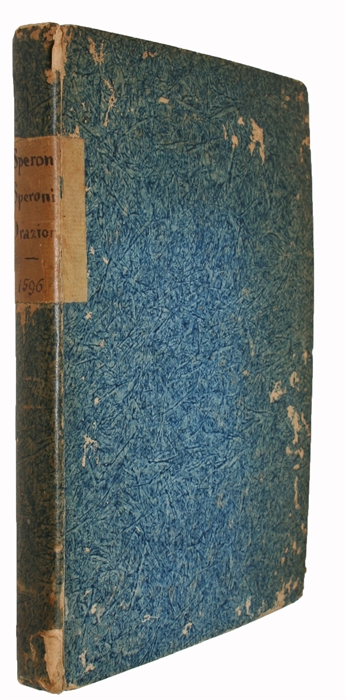ESTABLISHING THE GENRE OF MORAL ORATIONS
SPERONI, SPERON.
Orationi. Novamente Poste in Luce.
Venetia, Ruberto Meietti, 1596. (Colophon: In Venetia, 1596, Per Giovani Alberti). 4to. 18th century marbled blue paper binding with traces of wear, especially to spine and extremities. Handwritten paper title-label to spine. A few leaves evenly browned , and some leaves with a damp stain to upper margin, mostly faint. a bit of light brownspotting, but overall a nice and clean copy. Very discreet "stamp" to title-page ("tarquin") and a handwritten symbol with initials (a cross with A. L. M. F. at the ends) to verso of title-page. Woodcut allegorical title-vignette, woodcut printer's device to colophon, and large woodcut initial at beginning. A lovely printing. (8), 215, (1). With a preface, in which Speroni's friend Ingolfo Conte de Conti dedicates the work to the Duke of Urbino. ("Di Padoua di 16. Decembre, 1596").
The scarce first edition of Speroni's highly important work of orations, which is responsible for establishing the entire genre of moral orations and for Speroni's reputation as the first Italian orator.
Sperone Speroni, one of the important cultural figures of the time, known from Torquato Tasso, his pupil, as "Sperone, who possesses fully all the arts and sciences", counts as the dominant literary figure on the "terraferma" in the generation following Bembo. During the early 1520s Speroni studied with the greatest of the Renaissance philosophers, Pietro Pomponazzi, and by the 1530s had become a major light at Padua, where he became professor of logic and general philosophy. Due to his eminent oration skills and his widely acknowledged and remembered speeches, he became known as the first Italian orator, and as the first modern thinker to incorporate moral themes into his speeches
"Il passait pour le premier orateur de l'Italie... il a réussi dans ses poésies par la grâce et la vivacité, enfin, selon Ginguené, "son style en prose est un des meilleurs de cd siècle"... il est le premier Italien qui ait traité dans ce genre des questions de morale." (N.B.G.)
He is widely famed for having helped found and shape the Paduan Accademia degli Infiammati (1540).
The present work contains his 9 famous orations that each in their way came to influence the development of rhetoric, morals and politics of the Renaissance. In his "In morte del Cardinal Pietro Bembo", he showed that a great literature might be produced if Petrarch were studied and imitated in Italian just as the classics were in Latin, directly influencing the emergence of Petrarch-scholarship.
But the most famous of the orations is probably the controversial "Contra le Cortigiane" ["oratin against the Courtesans"], in which he accuses the courtesan of being a glutton and vain, and taking advantage of the name "corte" (court), which associates her erroneously with the noble and honourable environment of the court. "Oh, diabolic pride! Base prostitute, of which state, and of which subjects are you a mistress?". His words finally metamorphose her from woman to serpent or half beast and half devil. (See: Paola Malpezzi Price, "Moderata Fonte: Women and Life in Sixteenth Century Venice", p. 74).
The collection of his orations in the first printing became highly influential in the late Renaissance and came to determine the development of the art of writing speeches as well as a certain way of presenting philosophy and moral thought to the people.
Order-nr.: 19244


